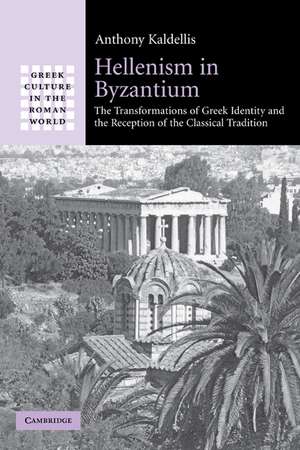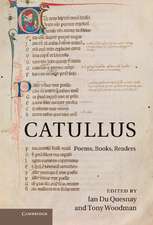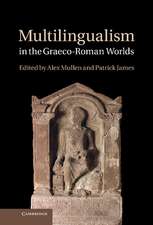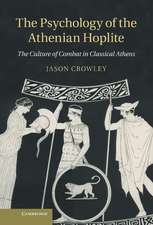Hellenism in Byzantium: The Transformations of Greek Identity and the Reception of the Classical Tradition: Greek Culture in the Roman World
Autor Anthony Kaldellisen Limba Engleză Paperback – 29 iun 2011
| Toate formatele și edițiile | Preț | Express |
|---|---|---|
| Paperback (1) | 448.80 lei 6-8 săpt. | |
| Cambridge University Press – 29 iun 2011 | 448.80 lei 6-8 săpt. | |
| Hardback (1) | 873.01 lei 6-8 săpt. | |
| Cambridge University Press – 30 ian 2008 | 873.01 lei 6-8 săpt. |
Din seria Greek Culture in the Roman World
-
 Preț: 215.75 lei
Preț: 215.75 lei -
 Preț: 201.39 lei
Preț: 201.39 lei -
 Preț: 315.25 lei
Preț: 315.25 lei -
 Preț: 230.58 lei
Preț: 230.58 lei -
 Preț: 290.96 lei
Preț: 290.96 lei -
 Preț: 235.13 lei
Preț: 235.13 lei - 8%
 Preț: 530.68 lei
Preț: 530.68 lei -
 Preț: 286.30 lei
Preț: 286.30 lei -
 Preț: 206.57 lei
Preț: 206.57 lei - 14%
 Preț: 733.20 lei
Preț: 733.20 lei - 14%
 Preț: 755.69 lei
Preț: 755.69 lei -
 Preț: 287.28 lei
Preț: 287.28 lei -
 Preț: 401.19 lei
Preț: 401.19 lei -
 Preț: 320.90 lei
Preț: 320.90 lei -
 Preț: 364.80 lei
Preț: 364.80 lei - 11%
 Preț: 695.06 lei
Preț: 695.06 lei -
 Preț: 324.03 lei
Preț: 324.03 lei -
 Preț: 324.40 lei
Preț: 324.40 lei - 14%
 Preț: 777.00 lei
Preț: 777.00 lei -
 Preț: 258.43 lei
Preț: 258.43 lei -
 Preț: 325.01 lei
Preț: 325.01 lei -
 Preț: 340.34 lei
Preț: 340.34 lei - 11%
 Preț: 698.50 lei
Preț: 698.50 lei -
 Preț: 283.63 lei
Preț: 283.63 lei - 14%
 Preț: 885.74 lei
Preț: 885.74 lei -
 Preț: 323.05 lei
Preț: 323.05 lei - 14%
 Preț: 768.27 lei
Preț: 768.27 lei -
 Preț: 287.48 lei
Preț: 287.48 lei - 14%
 Preț: 766.25 lei
Preț: 766.25 lei -
 Preț: 284.78 lei
Preț: 284.78 lei - 11%
 Preț: 696.26 lei
Preț: 696.26 lei - 11%
 Preț: 695.59 lei
Preț: 695.59 lei - 14%
 Preț: 689.49 lei
Preț: 689.49 lei -
 Preț: 423.61 lei
Preț: 423.61 lei - 11%
 Preț: 694.04 lei
Preț: 694.04 lei - 14%
 Preț: 758.22 lei
Preț: 758.22 lei - 11%
 Preț: 704.99 lei
Preț: 704.99 lei
Preț: 448.80 lei
Nou
85.89€ • 89.56$ • 71.38£
Carte tipărită la comandă
Livrare economică 21 martie-04 aprilie
Specificații
ISBN-10: 052129729X
Pagini: 482
Ilustrații: black & white illustrations
Dimensiuni: 152 x 229 x 27 mm
Greutate: 0.7 kg
Editura: Cambridge University Press
Colecția Cambridge University Press
Seria Greek Culture in the Roman World
Locul publicării:Cambridge, United Kingdom
Cuprins
Recenzii
'Kaldellis's book brings many provocative points to an area of Byzantine studies that had stagnated for several decades. The contention that 'Hellenism' in Byzantium was synonymous with 'paganism' has always been unconvincing, but Kaldellis is the fist modern scholar to devote a book-length study to the topic.' The Journal of Speculum
Descriere
This text was the first systematic study of what it meant to be 'Greek' in late antiquity and Byzantium, an identity that could alternatively become national, religious, philosophical, or cultural. Through close readings of the sources, Professor Kaldellis surveys the space that Hellenism occupied in each period; the broader debates in which it was caught up; and the historical causes of its successive transformations. The first section (100-400) shows how Romanisation and Christianisation led to the abandonment of Hellenism as a national label and its restriction to a negative religious sense and a positive, albeit rarefied, cultural one.
The second (1000-1300) shows how Hellenism was revived in Byzantium and contributed to the evolution of its culture. The discussion looks closely at the reception of the classical tradition, which was the reason why Hellenism was always desirable and dangerous in Christian society, and presents a new model for understanding Byzantine civilisation.


















